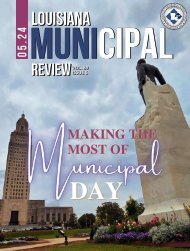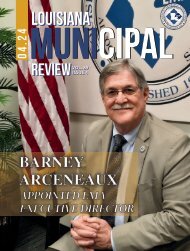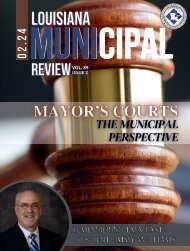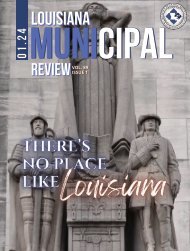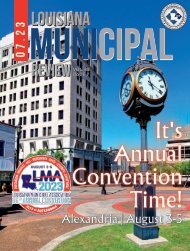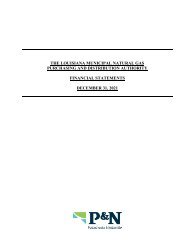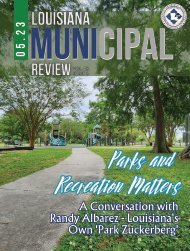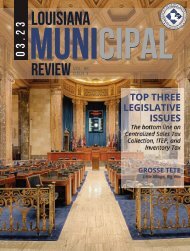LMR April 2021
You also want an ePaper? Increase the reach of your titles
YUMPU automatically turns print PDFs into web optimized ePapers that Google loves.
Feature
• The composition of the commission’s 8-member governing
body is similar to the makeup of the Remote Sellers
Commission (reference above)
• The LMA has a guaranteed appointee on the board, and
the first chairman of the commission’s board will be a local
representative
• There are three other local reps (see associations above),
the Secretary of the Department of Revenue, and then
appointees by the Governor, Speaker of the House, and
President of the Senate
• The administrative and operational rules of the commission
require a 2/3 vote of board members
• Tax returns and tax monies (which shall always remain
the property of the taxing authority) shall be promptly
remitted to the single parish collectors
• The commission will succeed both the Remote Sellers
Commission and the Louisiana Uniform Local Sales Tax
Board, absorbing all their authorities, including:
o becoming the single entity for the issuance of tax policy
advice,
o inheriting the current authority of the Remote Seller’s
Commission to audit remote dealers, and
o inheriting the current work of the Louisiana Uniform
Local Sales Tax Board to create a streamlined audit
process for taxpayers with physical presence in the
state
• The statutory component that provides all the details regarding
implementation of this conceptual commission
requires a 2/3 vote of each house of the legislature
• Unless and until that statutory companion is enacted,
sales tax collections shall continue to be conducted as
they are currently
Arguably, this new commission would also absorb other important
existing tools. Since 2008, Louisiana businesses with a
physical nexus in the state (non-remote or “brick-and-mortar”
businesses) have had the ability to file and remit their sales
taxes online for all 64 parishes and the state through a single
online platform called “Parish E-file.” The platform and system
are governed by a five-member advisory committee (Uniform
Electronic Local Return and Remittance Advisory Committee)
comprised of representatives of local governments, CPAs, tax
collectors, retailers, and LABI. To date, the Parish E-file site has
processed well over $20 billion in sales tax remittances.
The operations of this platform would be subsumed into the
new streamlined commission.
The Louisiana Uniform Local Sales Tax Board has developed a
wealth of resources for taxpayers and taxing authorities since
its inception in 2017. It provides expert tax opinions and advice
and has developed processes for taxpayers to pay past
due taxes with reduced or waived penalties (VDA) and to file
multi-parish refund claims. Of paramount importance, the
LULST has addressed a decades-old complaint by businesses
who lament that there is no reliable way to know the applicable
tax rates by location. The Tax Rate Lookup Application is
a user-friendly, free online tool that allows taxpayers to find
precise sales tax rate information either by single inquiry or in
bulk via software interface. Hopefully, this lookup tool would
also be incorporated into the new central sales tax administrative
body.
There is a myriad of other ancillary issues that have not been
fully explored, such as what impact the creation of this commission
would have on bonded indebtedness and bond covenants.
In this age, it is also important to consider what safeguards
would be offered in the event that the central collector
of all state and local sales taxes was subject to a cyberattack.
A ransomware attack could simultaneously freeze the flow of
sales tax revenue for the state, 64 parishes, 303 municipalities,
and other taxing authorities.
The outcome of HB 199 is uncertain at this time, but most
agree that there will be multiple attempts to modify this proposed
constitutional amendment as it makes its way through
the legislative process. Our pledge is to keep our members
informed at every step.
Please review HB 199 by visiting the legislative website at
www.legis.la.gov and provide us with your thoughts and feedback
on this critical issue.
Inventory Tax and ITEP
In 2016, Governor Edwards used his executive authority to
grant local governments a definitive voice in granting property
tax exemption under the Louisiana Industrial Ad Valorem
Tax Exemption Program (ITEP). Since then, there have been
legislative attempts to limit or rescind that authority. The incentive
program administered by Louisiana Economic Development
(LED) is available to manufacturers new to Louisiana
and to existing manufacturers in Louisiana who engage in
new investments to existing facilities. Upon local approval,
ITEP now offers an 80% property tax abatement for an initial
term of five years with the possibility of a renewal for five additional
years at 80%. LED has developed an efficient process
for those local governments affected by ITEP applications to
either approve or deny the manufacturer’s application based
on cogent criteria, including fiscal impact, job creation, and
community benefit. Prior to 2016, the program provided
100% exemption of local property taxes for 10 years with no
local input.
Although these are local property taxes and although over
90% of all ITEP applications since 2016 have been approved,
opponents to local input assert that the current system is just
too burdensome and unpredictable. Many favor a return to
when Louisiana was the outlier in the nation as the only state
in which those local governments had no say-so in whether
LMR | APRIL 2021 Page 11



